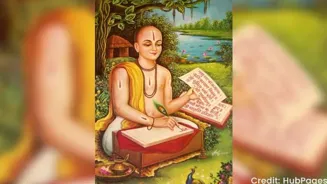Before prose, policy, and printing presses, India’s ancient poets captured its spirit in verse—crafting a literary legacy that still echoes through the
subcontinent
India’s earliest poets weren’t just entertainers; they were the architects of imagination, philosophers of power, and guardians of wisdom. Long before India became a political entity, it was a vibrant cultural idea—spoken into being by poets.
Their verses beautifully chronicled kings, challenged old beliefs, serenaded the divine, and outlined moral values. Whether in royal courts or monastery libraries, these poetic pioneers gave voice to a lively civilisation in constant motion.
Here are some of ancient India’s most influential poets—their patrons, their works, and the lasting impact of their words.

Kalidasa: The poet laureate of classical India
Arguably India’s most celebrated classical poet, Kalidasa thrived at the court of Chandragupta II Vikramaditya. His body of work—from the cosmic romance Kumarasambhava to the lyrical longing in Meghaduta—demonstrates Sanskrit at its artistic zenith.
His dramas (Abhijnanashakuntalam) inspired translations across Europe and garnered Goethe’s admiration centuries later. Kalidasa’s integration of nature, love, and spiritual symbolism defined the boundaries of Indian poetics.
Banabhatta: Voice of the emperor
Serving as the court poet of Harshavardhana, Banabhatta wrote the Harshacharita, India’s earliest known historical biography. His prose-poetry hybrid Kadambari is a complex web of layered storytelling. Banabhatta composed with intellectual elegance, blending realism with idealism—his work provides both documentation and drama.
Ashvaghosha: The bard of Buddhism
One of the earliest known Sanskrit dramatists and thinkers, Ashvaghosha lived under the patronage of Kanishka, the Kushana emperor. His masterpiece Buddhacharita renders the life of the Buddha in courtly verse. His other epic, Saundarananda, contrasts renunciation with sensuality, exemplifying Buddhism’s complex dialogue with poetry and philosophy.

Thiruvalluvar: Tamil wisdom in couplets
A moral philosopher and poet of remarkable brevity, Thiruvalluvar authored the Thirukkural, a 1,330-verse work blending ethics, statecraft, and love. Written in Tamil, it transcends sect and caste. Unlike Sanskrit’s courtly tone, the Thirukkural addressed common people—and still does, two millennia later.
Dandin: Critic and craftsman
Dandin, a grammarian and prose stylist, authored the Dashakumaracharita, a picaresque story of ten princes. His Kavyadarsha remains a fundamental work on Sanskrit poetics. Writing at the Pallava court, he combined wit with scholarly insight, shaping a blueprint for Indian literary aesthetics.

Credit: Prepp
Harisena: Poetry meets power
Inscribed on the Allahabad Pillar, Harisena’s Prayag Prashasti immortalised the military feats of Samudragupta. His work straddles eulogy and epigraphy, demonstrating how poetry served as imperial propaganda—and how verse could carve memory into stone.
Jayadeva: The mystic minstrel
A 12th-century devotee-poet in the court of Lakshmanasena, Jayadeva composed the Gita Govinda, a lyrical celebration of Radha and Krishna's divine love. His sensuous yet devotional verses laid the foundation for the Bhakti movement and were adapted into temple dance and classical music.

Bhavabhuti: The dramatist of devotion
Contemporary to Kalidasa but often overshadowed, Bhavabhuti served Yashovarman and authored some of the most introspective Sanskrit plays, such as Uttararamacharita and Malatimadhava. His works delve into themes of remorse, renunciation, and dharma with a psychological depth uncommon for the era.
Jinasena: Voice of the Jain tradition
A Jain monk and scholar, Jinasena, prospered under Amoghavarsha. His Adipurana and Mahapurana combine history, theology, and allegory. As Jainism's literary ambassador, Jinasena stressed non-violence, renunciation, and ethical governance.
More voices, one civilisation
Other luminaries such as Vishakhadatta (Mudrarakshasa), Shudraka (Mrichchakatika), Ravikirti (Aihole Inscription), Amarsimha (Amarakosha), and Magha (Shishupalavadha) further enriched India’s literary landscape. Whether praising kings, questioning fate, or crafting linguistic beauty, these poets shaped the spirit of a civilisation.
















